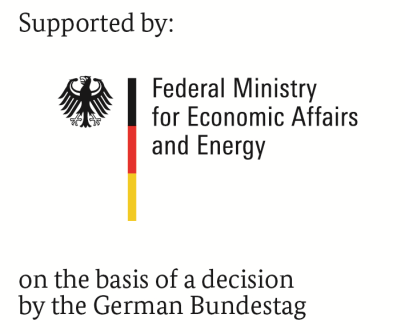Capture, simulation, and evaluation of the thermomechanical damage mechanisms of elastomer components under dynamic mechanical loads
The influence of temperature on the material properties and durability of elastomers was investigated by the Research Group SzM and the Institute of Mechanics at the University of the Federal Armed Forces in Munich as part of the BMWi-funded project "Elasto-Opt”.
An investigation of characterizing mechanical and thermal properties was executed for a natura- rubber-based, elastomer blend (6o Shore A). Both properties turned out to be significantly temperature dependent.
At the same time, investigations conducted with parallel measurement of the sample surface in the infrared spectrum show that the self-heating of materials is very strong when they are under dynamic loads. Even without heat transfer from the material’s external environment, this self-heating is so prominent that the material’s properties can change significantly. Investigations of the durability of materials were performed on hourglass-shaped samples, as well as various structural component samples. These analyses showed that the material’s durability is also dependent on temperature.
In order to make both the property changes and the, with increasing temperature, lower durability of the material calculable, a model made of thermo-viscoelastic material was initially developed. This model is bidirectionally coupled, and reproduces mechanical and thermal material behavior. With this model, the self-heating of the material can be calculated through loads depicted in a Finite-Element-Analysis, by which the mechanical behavior of the material can change depending on the predominant temperature. This material model has been integrated into a new method that can estimate local temperatures using a sequential load-time progression. For every segment of a load-sequence the material’s self-heating by means of an FEA and the temperature change caused by the model’s surrounding environment by means of analytical calculation, are being summed. Finally this method results to a continuous temperature profile.
The overall goal here is to design a conceptual approach for the temperature-dependent life-cycle assessment. This describes the procedure of the experimental material characterization and generation of S-N curves through the FEA and computationally estimated temperature up to the temperature dependent cumulative damage. Finally, the concept is validated by means of the hourglass-shaped sample, and used for the life-cycle assessment of an elastomer bearing as an example.
The completed report of this research project is available at the office of the FKM.
The research project “Elasto-Opt”, IGF project no. 400 ZN of the “Forschungskuratorium Maschinenbau e.V. (FKM)”, was funded by the AiF as part of the program for »Joint Industrial Research (IGF)« by the German Federal Ministry of Economics Affairs and Energy (BMWi) as decided by the German Parlament.




